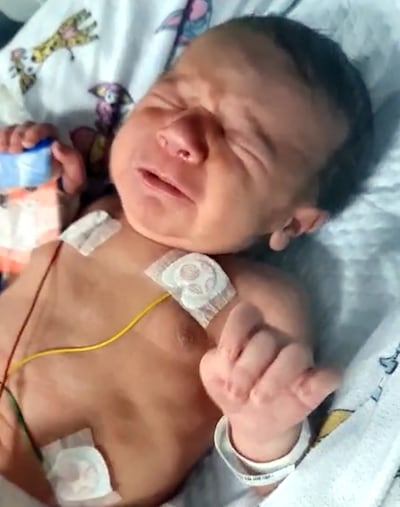A five-month-old Emirati boy has become the youngest in the country to receive a liver transplant after an aunt's lifesaving donation.
Ahmed Yahya’s liver was failing because of a rare genetic condition. As doctors appealed for a suitable living donor, time was running out for Ahmed until his 36-year-old aunt volunteered to help.
Parents Yahya and Zainab Al Yassi had experienced tragedy before, when their first son succumbed to a similar condition. Ahmed's fight depended on the good fortune of finding a genetic match to ensure his 4.4kg body would not reject a donor organ.
Now, to mark World Organ Donation Day on August 13, Ahmed's family and the doctors are talking about the operations that saved his life.
“I still remember the pain when we lost our first son to liver disease,” said Mr Al Yassi.
“When we heard our second son had a similar problem, I thought this was our destiny. But the doctors gave us new hope. And my sister-in-law, she gave us life again. My baby’s recovery is nothing short of a miracle.”
Unbreakable bond
Ahmed’s aunt, who had never considered becoming a donor, immersed herself in research and discussions with the transplant team.

“I read everything I could find,” she said. “I realised that donating part of my liver could save his life, and I knew I had to do it. It’s a bond that nothing in this world can break.”
Doctors first raised concern when they recorded high liver enzymes shortly after Ahmed was born. Doctors at Burjeel Medical City (BMC) diagnosed him with an ATP6AP1-related congenital disorder of glycosylation, a disorder so rare there are fewer than 25 known cases worldwide.
Ahmed's aunt – the wife of his father’s brother – volunteered and discovered she was a perfect match. Doctors rushed both to surgery. Ahmed, and his brother, were named in honour of their grandfather, who died in 2010 from liver disease.
As Ahmed was so young, the procedure proved to be one of the most technically challenging paediatric surgeries conducted in the Gulf region, said doctors who performed the surgery in April.
“This disease is a severe, multisystem condition that particularly affects the liver,” said Dr Johns Shaji Mathew, abdominal transplant and hepato pancreatico biliary surgeon at BMC.
“In Ahmed’s case, the disorder was progressing rapidly towards liver failure. Given the rarity of the condition, there were no clear answers, only tough questions. Yet we had to act.”

Rare condition
Congenital disorders of glycosylation affect the healthy function of cells. A chemical malfunction results in a number of serious health problems such as liver disease, abnormal bleeding, seizures and heart problems.
Doctors prepared a graft from the donor to fit Ahmed. In total, the complex surgery took 12 hours.
Despite the high-risk nature of the operation and the boy's fragile condition, the surgery was a success. Ahmed began feeding within days, and his liver function was excellent. He now belongs to about two dozen survivors through transplantation.
“In an infant this tiny, every structure is delicate beyond imagination, each vessel was thinner than a matchstick, and the margin for error was virtually zero,” said Dr Gourab Sen, director of transplant surgery at the Burjeel Abdominal Multi-Organ Transplant Programme.
“The surgery required not only technical expertise but constant focus, as we were working in millimetres, sometimes even fractions of a millimetre.
“It is not just a surgical procedure, it is micromillimetre craftsmanship performed under extreme pressure, with every member of the team synchronising perfectly to keep the child stable throughout.”
Since the launch of Hayat – the National Programme for Donation and Transplantation of Human Organs and Tissue – in 2017, a total of 1,090 organ transplants have been performed across the Emirates until 2024, with 290 during the past year alone.
The 2024 list comprised seven heart transplants, 142 kidney transplants, 117 liver transplants, 22 lung transplants, and two pancreas transplants.
Inspirational story
These achievements are made possible by four leading transplant centres, including Cleveland Clinic Abu Dhabi, Sheikh Khalifa Medical City, BMC and Sheikh Shakhbout Medical City.
Mr Al Yassi said he hoped his son’s success may encourage more people to consider becoming organ donors.
“We were once a family living in fear of losing another child, but now we are celebrating a second chance at life,” he said. “I hope our story inspires others to come forward, to learn more, and to consider becoming donors. You never know whose life you might change.”

